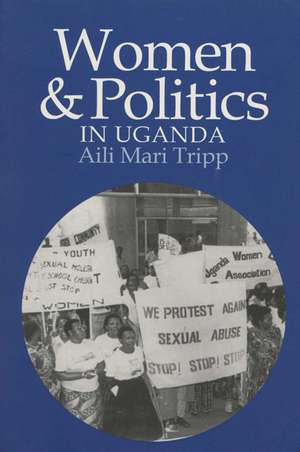Women and Politics in Uganda
Autor Aili Mari Trippen Limba Engleză Paperback – 5 mai 2000
Uganda has attracted much attention and political visibility for its significant economic recovery after a catastrophic decline. In her groundbreaking book, Aili Mari Tripp provides extensive data and analysis of patterns of political behavior and institutions by focusing on the unique success of indigenous women’s organizations.
Tripp explores why the women’s movement grew so dramatically in such a short time after the National Resistant Movement took over in 1986. Unlike many African countries where organizations and institutions are controlled by a ruling party or regime, the Ugandan women’s movement gained its momentum by remaining autonomous.
Tripp explores why the women’s movement grew so dramatically in such a short time after the National Resistant Movement took over in 1986. Unlike many African countries where organizations and institutions are controlled by a ruling party or regime, the Ugandan women’s movement gained its momentum by remaining autonomous.
Preț: 241.41 lei
Nou
Puncte Express: 362
Preț estimativ în valută:
46.19€ • 48.35$ • 38.45£
46.19€ • 48.35$ • 38.45£
Carte tipărită la comandă
Livrare economică 31 martie-14 aprilie
Preluare comenzi: 021 569.72.76
Specificații
ISBN-13: 9780299164843
ISBN-10: 0299164845
Pagini: 336
Dimensiuni: 152 x 229 x 30 mm
Greutate: 0.48 kg
Ediția:1
Editura: University of Wisconsin Press
Colecția University of Wisconsin Press
ISBN-10: 0299164845
Pagini: 336
Dimensiuni: 152 x 229 x 30 mm
Greutate: 0.48 kg
Ediția:1
Editura: University of Wisconsin Press
Colecția University of Wisconsin Press
Recenzii
“A pathbreaking study that analyzes the inter-relationships between national and local politics and the women’s movement in an African setting.”
—Margaret Snyder, UNIFEM
—Margaret Snyder, UNIFEM
Notă biografică
Aili Mari Tripp is assistant professor of political science and women’s studies at the University of Wisconsin–Madison.
Descriere
Uganda has attracted much attention and political visibility for its significant economic recovery after a catastrophic decline. In her groundbreaking book, Aili Mari Tripp provides extensive data and analysis of patterns of political behavior and institutions by focusing on the unique success of indigenous women’s organizations.
Tripp explores why the women’s movement grew so dramatically in such a short time after the National Resistant Movement took over in 1986. Unlike many African countries where organizations and institutions are controlled by a ruling party or regime, the Ugandan women’s movement gained its momentum by remaining autonomous.
Tripp explores why the women’s movement grew so dramatically in such a short time after the National Resistant Movement took over in 1986. Unlike many African countries where organizations and institutions are controlled by a ruling party or regime, the Ugandan women’s movement gained its momentum by remaining autonomous.
